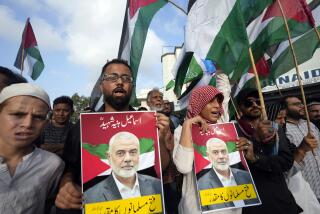Expecting Snubs, U.S. Goes It Alone
- Share via
WASHINGTON — Unlike almost all other exercises of U.S. armed force since the end of the Cold War, the missile assault on Iraq early Tuesday was exclusively an American show, staged without any military help and with only tepid political support from Washington’s allies.
At first glance, the attack seemed to fray the alliance that five years ago turned back Iraqi President Saddam Hussein’s invasion of Kuwait. Of the leading elements of the Persian Gulf War coalition, only Britain gave unreserved support to Tuesday’s action, while France, Turkey and the Arab states expressed serious doubts. Russia, which was not a member of the Gulf War coalition, was sharply critical.
But the Clinton administration was remarkably unconcerned. Officials said the United States had ample military power to act on its own and that although greater political support would have been welcome, it was unnecessary.
Besides, they said, Washington may have preserved the essential unity of the alliance by not forcing reluctant members to stand up and be counted this time.
In Turkey, France and most of the Arab world, a strong statement of support for the U.S. action would surely have been unpopular with large segments of the public. U.S. emissaries, in effect, told these governments that such a move was not really necessary--although they would be expected to help out later if required.
Officials happily noted that although many of the coalition countries questioned Washington’s response, all of them condemned the Iraqi military attack on the Kurdish north that prompted the missile strike.
“The international coalition against Saddam Hussein is intact,” State Department spokesman Nicholas Burns said. “Countries made their own decisions about what they would do. This is a fact of life of coalitions.”
The administration decided it did not have time for the tedious coalition-building diplomacy that delayed for months the armed response to Iraq’s 1990 invasion of Kuwait. “Our response must be and will be forceful and immediate,” Secretary of State Warren Christopher said.
Christopher is scheduled to leave today for Europe on a trip during which he is to confer with British, French, German and Israeli officials. Although the trip was planned weeks ago, Burns said, the situation in northern Iraq will now be a focus of discussions. Britain and Germany are already on board, but Christopher has a selling job to do in Paris.
The Pentagon launched missiles from B-52 bombers and from warships, avoiding the use of nearby air bases in Turkey, Jordan and Saudi Arabia. Officials admitted that permission to use the bases probably would have been denied, so they did not ask.
In Turkey, the only North Atlantic Treaty Organization country bordering Iraq, diplomatic sources said the United States decided not to risk seeking to use Turkish facilities. The thinking was that a Turkish rejection might jeopardize existing rights to use the strategic Incirlik base in southern Turkey to enforce the “no-fly” zone that has existed in northern Iraq since Hussein cracked down on the Kurds in the wake of the Gulf War.
Across the Arab world, reaction to the raid ranged from unenthusiastic to caustic. Even U.S. allies like Egypt and Jordan expressed doubts.
Gen. John M. Shalikashvili, chairman of the Joint Chiefs of Staff, visited Washington’s Arab allies over the weekend, explaining U.S. plans. But a Western diplomatic source in Amman, the Jordanian capital, said Shalikashvili did not ask for endorsement of the strike, probably because he realized he would not get it. The official implied that U.S. policymakers understood the Arabs’ position.
“Did he go away wringing his hands and shaking his head because he did not get an ‘Attaboy’? . . . No, that’s not the reason he came here,” the source said.
Aside from Iraq itself, Turkey may have suffered the most damage from the Iraqis’ weekend attack on the Kurds and the U.S. response, including suspension of a U.N.-approved plan to allow Iraq to sell up to $2 billion worth of oil every six months. The Ankara government stood to earn millions of dollars from Iraq’s use of a pipeline across Turkey to ship oil to market.
Turkey, like its neighbors, knows it must live with the Iraqis over the long term. And in the Arab world, there is growing ambivalence about economic sanctions against Iraq because they seem to hit hardest at ordinary Iraqis. Although many Arabs would be happy to see Hussein deposed, Arabs generally are sympathetic to the once-proud Iraqi people and believe they have suffered enough.
Kempster reported from Washington and Montalbano reported from Ankara. Times staff writer John Daniszewski in Amman contributed to this report.
More to Read
Get the L.A. Times Politics newsletter
Deeply reported insights into legislation, politics and policy from Sacramento, Washington and beyond. In your inbox twice per week.
You may occasionally receive promotional content from the Los Angeles Times.








